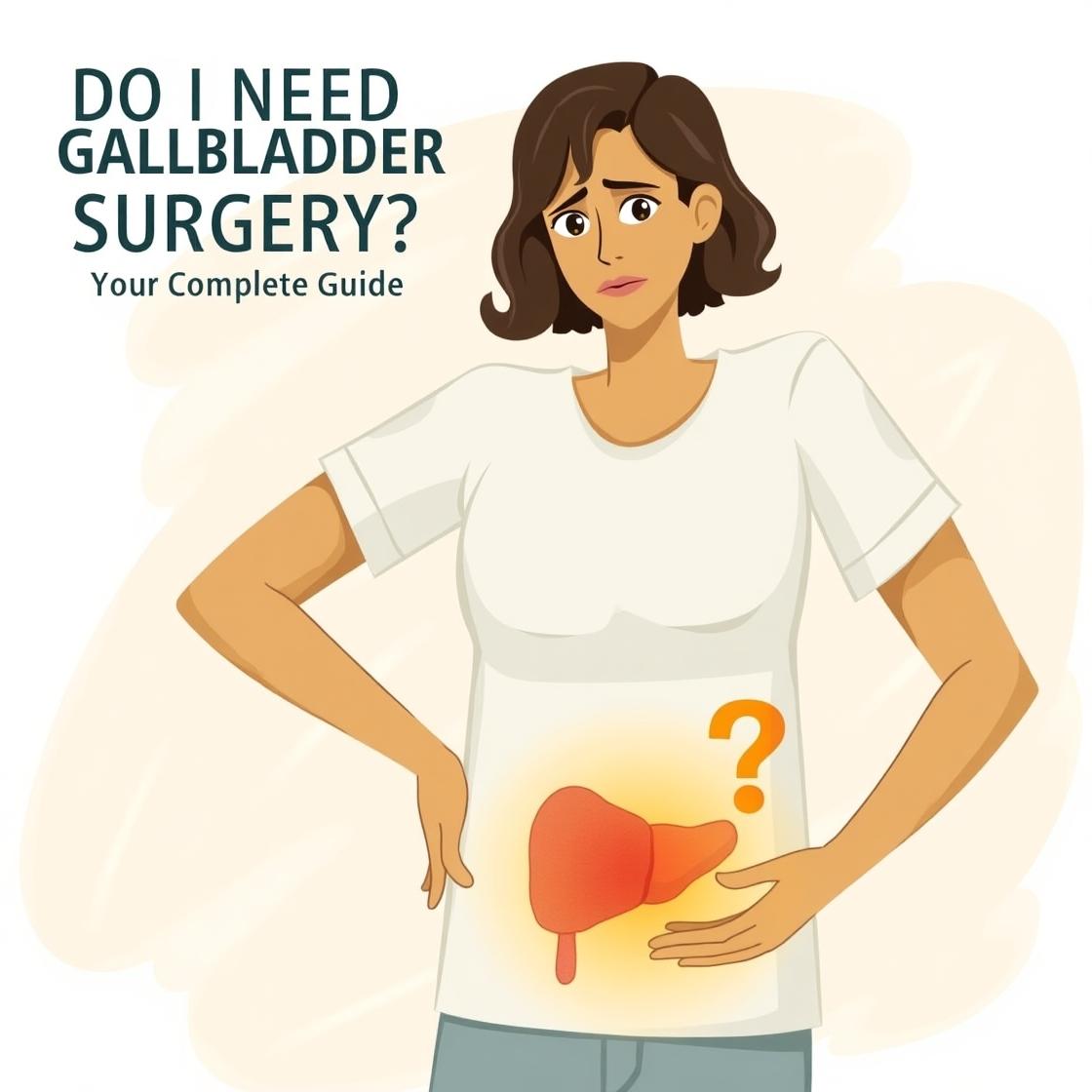
Do I Need Gallbladder Surgery? Your Complete Guide
The gallbladder is a small, pear-shaped organ tucked beneath your liver. It stores bile, a digestive fluid that helps your body break down fats. Though small, this organ can cause big issues when things go wrong.
Common Gallbladder Problems
Common gallbladder problems include:
- Gallstones (hard deposits of cholesterol or bile salts)
- Cholecystitis (inflammation of the gallbladder)
- Biliary colic (pain due to gallstone blockage)
Timely diagnosis and treatment are key to preventing complications. If you're asking, "Do I need gallbladder surgery?", read on to understand the signs, treatment options, and what to expect.
Common Reasons Why Gallbladder Surgery Might Be Recommended
Gallbladder removal (cholecystectomy) may be advised if:
- Gallstones are causing pain or infection
- You have chronic cholecystitis, where inflammation keeps recurring
- Biliary dyskinesia, a motility disorder where the gallbladder doesn't empty properly
- Gallbladder polyps, especially if they are large (>1 cm) or suspicious
Delaying treatment increases the risk of complications like gallbladder rupture, pancreatitis, or severe infections. In most cases, doctors recommend minimally invasive gallbladder surgery or keyhole gallbladder surgery to safely remove the organ.
Symptoms That Might Indicate a Need for Gallbladder Surgery
Wondering "Should I get gallbladder surgery?" Look out for these symptoms:
- Pain in the upper mid or upper right abdomen, especially after eating oily or fatty Indian meals like biryani, fried snacks, or gravies
- Nausea or vomiting
- Indigestion or bloating
- Fever, chills, or jaundice
- Repeated gallbladder attacks that disrupt your daily routine
Read more on why your stomach might be bloated.
Diagnostic Tests for Gallbladder Issues
To confirm if your gallbladder is the culprit, your doctor may recommend:
- Abdominal ultrasound – the first and most common test to detect gallstones
- HIDA scan (cholescintigraphy) – checks how well your gallbladder is functioning
- CT scan or MRCP – used in complicated cases to evaluate bile ducts
- Blood tests – to detect infection or liver-related problems
These tests help your gastroenterologist make an informed decision.
Alternatives to Surgery (If Any, and Their Limitations)
Some patients want to avoid surgery, which is understandable. Alternatives include:
Medications to dissolve gallstones
Usually bile acid pills, but with limitations:
- Not suitable for all types of stones
- Takes months to work and stones often return
Dietary changes
Such as low-fat meals and regular meal times:
- May reduce symptoms but not remove stones
While these may provide temporary relief, surgery remains the most definitive and long-term solution for symptomatic gallbladder issues.
Making the Decision: Discussing with Your Doctor
When in doubt, talk it out. Here's how you can take charge of your health:
- Consult a qualified gastroenterologist, like those at Bangalore Gastro Centre, to evaluate your case
- Ask questions, such as:
- What are the risks of waiting?
- What type of surgery is recommended?
- What can I expect during recovery?
- Weigh the risks vs. benefits – surgery has a high success rate and low complication risk
- Get a second opinion if unsure. Peace of mind matters.
Frequently Asked Questions About Gallbladder Surgery
1. Is Gallbladder Surgery Safe?
Yes, minimally invasive gallbladder surgery (laparoscopic cholecystectomy) is considered very safe. It involves small incisions and less pain, with fewer complications than open surgery.
2. What Happens During Gallbladder Surgery?
Here's a quick walk-through:
- You'll receive general anaesthesia
- The surgeon will make 3-4 tiny incisions for laparoscopic tools
- Your gallbladder is carefully removed and the incisions are closed
- In some cases (complex infections or complications), an open surgery may be performed
3. How Long Is Gallbladder Surgery?
- Laparoscopic surgery usually takes 30 to 60 minutes
- Open surgery might take longer—up to 2 hours
- Add some time for preparation and recovery at the hospital
4. Gallbladder Surgery Recovery
- Most patients go home the same day or next day
- Pain and bloating are common for a few days
- Avoid heavy lifting for 2 weeks
- Resume regular diet gradually; stick to light, low-fat meals initially
- Watch for complications: increasing pain, fever, yellowing of skin
5. Life After Gallbladder Surgery
You can absolutely live without a gallbladder. Here's what to expect:
- Bile will drip continuously into your intestine
- Some may experience loose stools or gas, especially after oily foods
- You may need to avoid rich Indian dishes initially but can gradually resume a normal diet
- Overall, digestion improves without the pain and disruptions caused by gallstones
6. Can You Live Without a Gallbladder?
Yes. Many people live full, healthy lives after gallbladder removal. The body adapts quickly. With mindful eating habits, digestion remains smooth. No major long-term health issues arise.
7. What Are the Surgery Costs in India?
The cost of gallbladder removal surgery in India ranges from INR 50,000 to INR 1.5 lakh depending on location, hospital, and whether it's open or laparoscopic.
8. Pre-Surgery Preparation Checklist?
- Blood and imaging tests
- Fasting for 6–8 hours before surgery
- Stop certain medications (as per doctor advice)
- Arrange post-surgery transport and support at home
9. Post-Surgery Diet Guidelines?
- Start with clear liquids, move to soft foods
- Avoid fried or fatty meals for a few weeks
- Introduce high-fiber foods gradually
10. Tips for Choosing the Right Surgeon?
- Look for a gastro or laparoscopic specialist
- Check hospital credentials and reviews
- Ask about the surgeon's experience with minimally invasive gallbladder surgery
Taking the Next Steps
If you're dealing with persistent pain, nausea, or digestive issues, it may be time to ask, "Do I need gallbladder surgery?"
Talk to a specialist, weigh your options, and take timely action to avoid complications. Consulting a gastroenterologist at a specialised centre like Bangalore Gastro Centre can help you make an informed, confident decision for your health.
